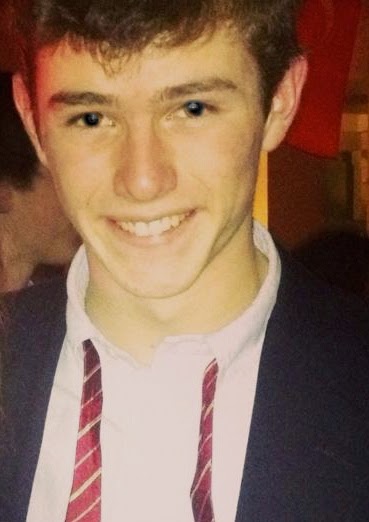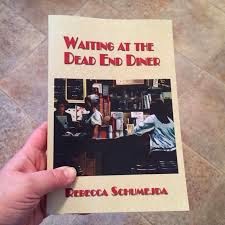Waiting At The Dead End Diner
Rebecca Schumejda
Bottom Dog Press
Review by Thomas Benfield
As dusk settles into night and streetlights begin to glow onto vacant sidewalks, through Rebecca Schumejda’s writing, we shuffle out of the cold and into the Dead End Diner. The poetry collection Waiting At The Dead End Diner is as much about Rebecca Schumejda’s time waiting tables, as it is a confession, about waiting for a transitory period in her life to end. There is palpable urgency, nostalgic dialogue, and conflict in her voice as a writer. Whether filling ketchup bottles or saltshakers, occupational activities become her platform to tackle deeper topics like love, friendship, and humanity. These poems should sit beside a bottomless cup of coffee, toast, and a dimly lit red leather stool, bolted into the ground at the counter. With blunt imagery, detailed dialogue, and well-hidden optimism, Waiting At The Dead End Diner is a working-class anthem.
A selection from the poem," Scheduling", reads, “Oil and vinegar are housed in separate bottles,/ but George schedules Jolene and Carrie/ to work the same shifts almost every week.” Throughout Waiting At The Dead End Diner, Rebecca Schumejda makes comparisons between people, relationships, or feelings, with common objects found in multiples on every table of every booth. These comparisons are often left unexplained. However, they all share the same theme. Sooner or later, every job or hobby will reveal a greater lesson. Waiting At The Dead End Diner is a collection of lessons taught by burns and spills to an audience of very few. But to those who can hear the message in each poem, we will be spared the monotony of 12-hour shifts usually needed for such epiphanies.
Rebecca Schumejda, much like a modern Hemingway, has mastered the use of short succinct sentences. Her poems read as easily as a grocery list. But as always, deeper contemplation is left to the reader,
The Décor
Since children never happened,
George’s wife adopts Chihuahuas,
dresses them in costumes
she designs herself.
She photographs them,
and hangs them framed
on the wall behind the register.
The Décor is just one of many uses of prose. Because Schumejda only reports factual action, the entire feeling of each piece is up for interpretation by the reader. This is an interesting tactic. It draws the reader immediately into analysis, sometimes before even completing the poem. The poem opens simply, “Since children never happened.” This vague statement with no further explanation begs the reader to ask, how does that make her feel? Or, why couldn’t she have children? This technique is interesting because there is no correct answer. The readers choose whether the poem is happy or sad, based on their own sensitivity towards each topic.
The crippling monotony of each shift grows on the reader throughout the book, “I start taking orders,/ prioritize- get drinks-/ refill coffees- bring out soups- place orders/ take another order- salads- place orders-/ extra dressing- bring out food- check on tables-/ find the rhythm of routine- drop checks.” (The Exterminator). Even the language used suggests an endless string of blue-collar days. Rebecca Schumejda writes accurately about her topic. The lack of rhyme schemes and meter makes these poems emulate the feeling of their action. Similarly, her use of heavy enjambment and figurative language provides a sense of urgency, which accurately grows and grows while working a dead end job.
Above all, these poems make me appreciative. As a student feeling the pressure of the future, we all like to think that we’ll become some kind of big shot. Throughout my life teachers and adults have threatened me, if I ever began to slack off. They would say that all I’d ever become is a waiter or a gas station attendant. The reinforcement of these jokes wore me down into thinking negatively about those professions. After reading Waiting At The Dead End Diner, I realized that every kind of work can either be done well or poorly. The profession only matters to the individual. Confidence only comes from your own perception of a job well done.
 |
| Thomas Benfield |
Thomas Benfield is a 19-year-old writer from Mystic Connecticut. He is an English major at Endicott College in Beverly, Mass. He is currently a freshman at Endicott College, pursuing a Creative writing major. Thomas attended Berkshire school, a four-year private boarding school in Sheffield Mass, where his love for writing was initiated. When Thomas is not writing he plays his original music that he has written for voice and guitar, surfs, and flies single engine airplanes.





































